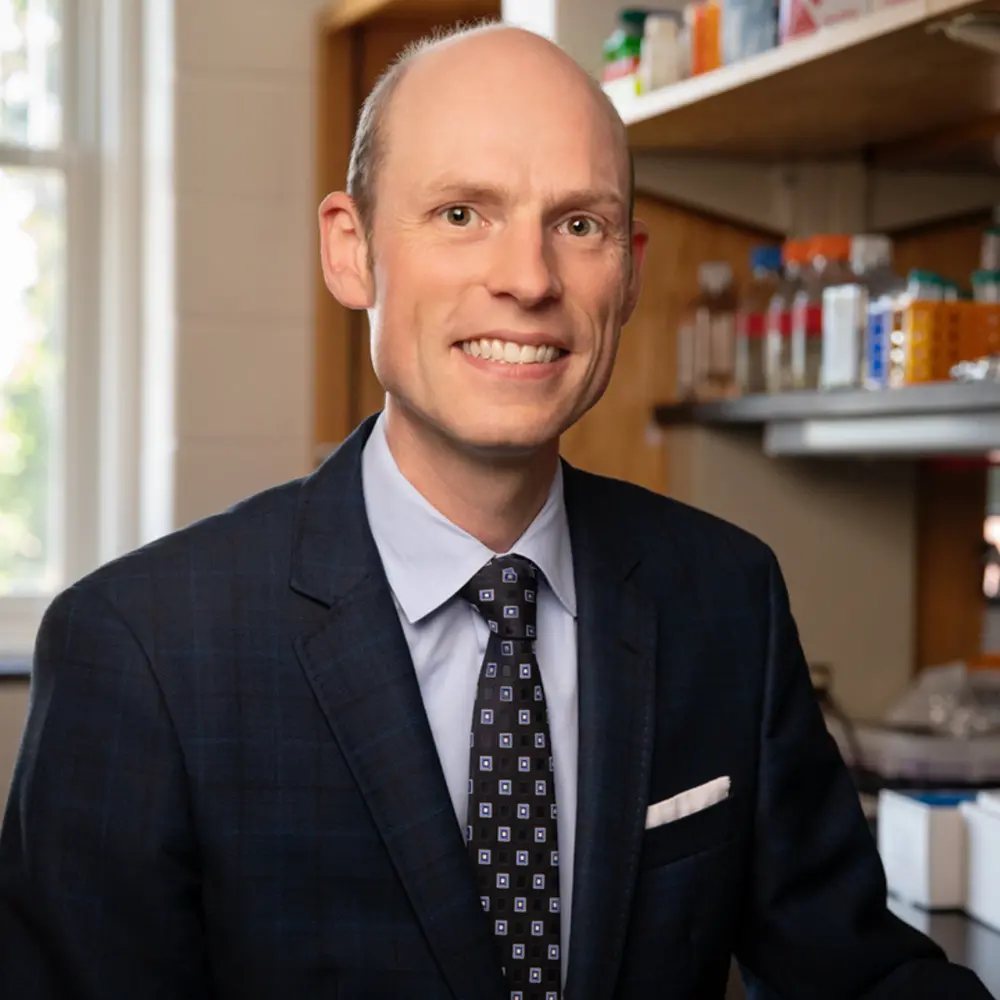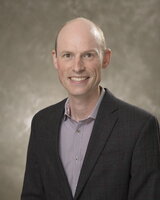
Erik Nelson, professor of molecular and integrative physiology, has won a $4.5 million Era of Hope Scholar Award from the United States Department of Defense Breast Cancer Research Program.This prestigious award supports individuals early in their careers who have demonstrated significant potential to effect meaningful change in breast cancer research. Recipients of the Era of Hope Scholar Award are leaders and visionaries in their respective field who go beyond conventional thinking to change the current landscape of breast cancer research and therapy.
Approximately one in eight women will be diagnosed with invasive breast cancer in their lifetime as it continues to be the second leading cause of cancer-related deaths in women in the U.S. The Department of Defense, in collaboration with several experts, has identified several areas of current shortcomings in the areas of breast cancer management, diagnosis, and therapy. Nelson will spearhead a collaborative and interdisciplinary research team to address several of these key areas.
“The American Institute for Cancer Research has previously funded our work on tumor dormancy and the funding from that source allowed us to develop the data necessary to move on to the next step and secure this award,” Nelson said. “What we plan on working on is multi-fold, but one of the big things is determining why and how breast cancer cells can lay dormant for years and then suddenly re-emerge. The other aspect of that is we're trying to eliminate the mortality associated with metastatic breast cancer, which accounts for more than 90 percent of all breast cancer-associated deaths.”
The prestigious Era of Hope award recognizes creative individuals who are pursuing paradigm-shifting research and show great promise and leadership potential in breast cancer research, said Benita Katzenellenbogen, Swanlund Professor of Molecular and Integrative Physiology and a renowned breast cancer researcher.
“This well defines what Erik is doing and there is no doubt that he will continue to shine as a rising star in the cancer scene at UIUC and far beyond as well,” Katzenellenbogen said.
Nelson’s two-fold approach involves leveraging cholesterol homeostasis to design better treatments for metastatic disease and to prevent metastatic recurrence. Previous work by Nelson’s group found that cholesterol was important for regulation of cancer and immune cells, providing the basis for why recurrence develops sooner in patients with high cholesterol levels. In subsequent work, they found that a metabolite of cholesterol, 27-hydroxycholesterol (27-HC), was in fact the causal link.
“With cancer cells, 27-HC seems to be able to activate the estrogen receptor, which for 60-70% of breast cancer patients, drives proliferation,” Nelson said. “We also found that it acted on a type of immune cell called a myeloid immune cell. This led to a highly immune-suppressive environment that prevented immune cells from mounting an effective response against cancer.”
One aspect of the project includes a collaboration with Paul Hergenrother, a professor of chemistry, to develop strategies in inhibiting the synthesis of 27-HC as well as developing drugs that target key biological regulators of cholesterol metabolism. Other collaborators include Phillip A. Sharp Professor of Biochemistry David Kranz; Stephen Boppart, professor of electrical and computer engineering; Saurabh Sinha, professor of computer science, Wawrzyniec Dobrucki, professor of bioengineering; William Helferich, professor of food science & human nutrition; and Wendy Woodward, professor and chief of clinical breast radiotherapy service at the University of Texas MD Anderson Cancer Center.
“We are working with bioengineers because we found that various metabolites can induce the secretion of cancer cell extracellular vesicles, but we don't know how to regulate or drug them,” Nelson said. “We are also working with William Helferich to determine if the cooking process of high-cholesterol foods contributes to the promotion of breast cancer metastasis. Cholesterol is amenable to lifestyle interventions and so we want to develop ways to change the diet by looking at cooking style.”
Nelson’s project also involves cancer research advocates, who are typically cancer survivors or caregivers of someone with cancer. Advocates provide unique perspectives to researchers and help inform patient-centered research. At the Cancer Center at Illinois, Nelson co-founded and co-leads a Cancer Research Advocacy Group along with Zeynep Madak-Erdogan, professor of food science & human nutrition, and advocates Sarah Adams, Lea Ann Carson, and Renaé Strawbridge. Outside of Illinois, Nelson has also recruited Jamie Holloway from a cancer research advocacy group at Georgetown University.
Cancer advocates are typically either survivors or caregivers to cancer patients and provide a unique perspective on the shortcomings of current clinical care. The Cancer Research Advocacy Group serves as the bridge connecting this perspective to research science. Interactions with advocates have shaped Nelson’s research direction and helped him focus his efforts to developing new strategies to prevent and treat metastatic breast cancer.
“Current therapies for metastatic disease are not very effective and our goal is to change that,” Nelson said. “I look forward to asking some big questions and starting to translate our studies into meaningful change for breast cancer patients.”
Nelson is involved in several interdisciplinary teams across campus, such as at the Carl R. Woese Institute for Genomic Biology and the Division of Nutritional Sciences, and his colleagues often seek his expertise, said Claudio Grosman, professor and head of the Department of Molecular and Integrative Physiology. Nelson's research and success inspire those around him, "and are symbolic of the rich history of academic excellence at the University of Illinois. The department is most proud of the high societal impact and intellectual value of Dr. Nelson's scientific accomplishments,” Grosman said.
“I am proud to see Erik, with his exceptional talent and vision, emerge as a leader of the breast cancer research community. We expect great things from his research program going forward,” said Milan Bagchi, director of the School of MCB.
The views expressed in this article/news release are those of the author and may not reflect the official policy or position of the Department of the Army, Department of Defense, or the U.S. Government.
